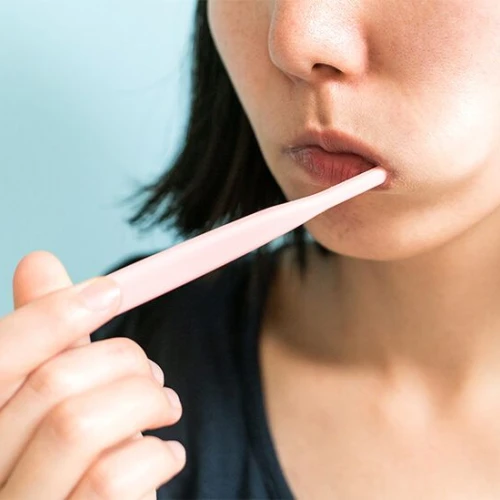Stopping bad breath is in most cases easy, and it always starts with good oral hygiene habits. Now, it is well known that most halitosis cases are caused by volatile sulphur compounds (VSCs) —smelly gases produced by bacteria in the mouth. Therefore, oral malodour can be diminished by reducing the number of food remnants or bacteria in the oral cavity or by converting VSCs to odourless compounds.3,4
However, several articles have shown that simply brushing your teeth may not be enough to address the issue. The most effective method to combat halitosis combines mechanical and chemical regimens to reduce VSCs and lifestyle modifications.3
Oral hygiene
The combination of tooth brushing, mouth washing and tongue cleaning is the most effective bad breath remedy since it reduces bacterial load and lowers the risk of gum discomfort.1
Brushing twice daily along with tongue cleaning can largely reduce malodour.
- Brush gently with very short, horizontal strokes across the tooth surface and gum line.
- Tongue cleaning should be carried out gently with low force and should be instructed thoroughly to avoid tissue trauma.
- Mouth rinses could be performed with mouthwashes containing chlorhexidine and zinc —the main ingredients in CB12. This combination counteracts bad breath for 12 hours by neutralizing the smelly sulphur compounds in the mouth, instead of just masking the smell with nice aromas.2,5
Teeth flossing and proper adjustment of dental prostheses —when applicable —also prevent the accumulation of food remains in the oral cavity and thus prevents halitosis.6
Diet and lifestyle modifications
Aim to make these daily modifications to fix bad breath issues1:
- Stay hydrated —Drinking plenty of water promotes saliva production and acts as a cleansing agent. Additionally, lack of saliva allows bacterial and VSCs build-up.7
- Mind your diet —greasy and sugary foods are linked with bad breath. Avoid foods and drinks that cause bad breath such as onions, garlic, tuna, alcohol and coffee.4
- Quit tobacco consumption —tobacco products leave their smell in the mouth and also cause dryness and gum disease.
- Visit your dentist for check-up/ examination.
When to see a medical professional
Consult your doctor or dentist if bad breath persists after making lifestyle changes and following oral hygiene recommendations.1
In some cases, an underlying health issue is the cause of bad breath. A medical professional can help you get a proper diagnosis and treatment.


